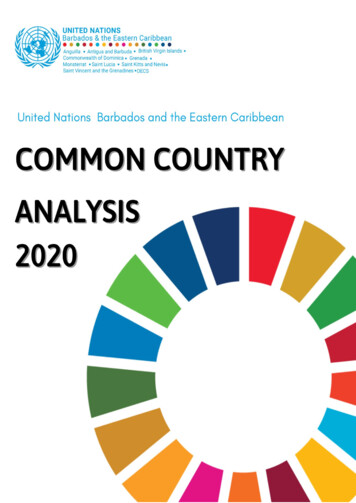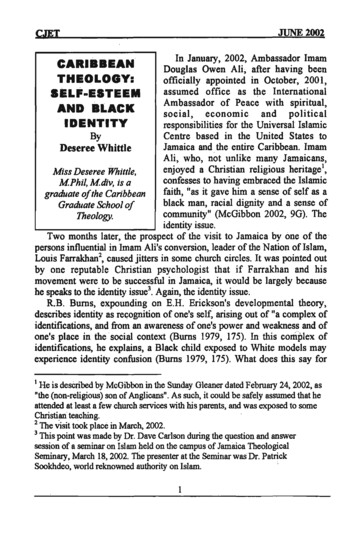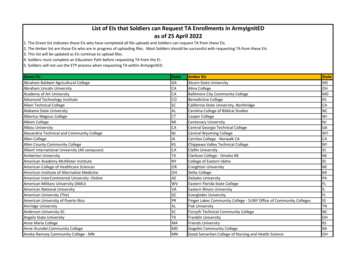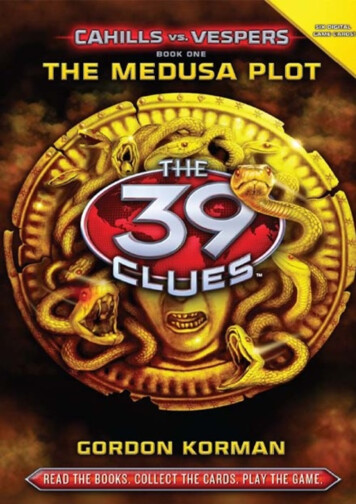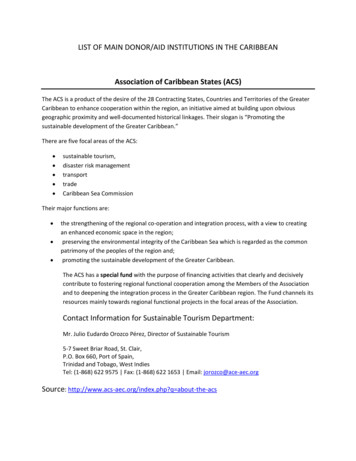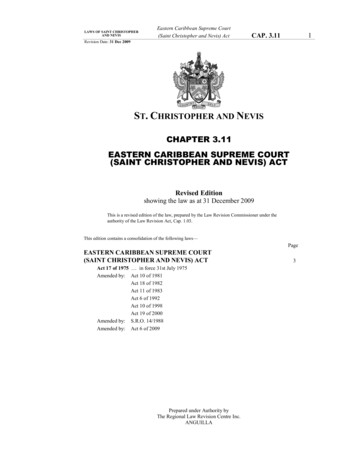
Transcription
LAWS OF SAINT CHRISTOPHERAND NEVISRevision Date: 31 Dec 2009Eastern Caribbean Supreme Court(Saint Christopher and Nevis) Act1CAP. 3.11ST. CHRISTOPHER AND NEVISCHAPTER 3.11EASTERN CARIBBEAN SUPREME COURT(SAINT CHRISTOPHER AND NEVIS) ACTRevised Editionshowing the law as at 31 December 2009This is a revised edition of the law, prepared by the Law Revision Commissioner under theauthority of the Law Revision Act, Cap. 1.03.This edition contains a consolidation of the following laws—EASTERN CARIBBEAN SUPREME COURT(SAINT CHRISTOPHER AND NEVIS) ACTAct 17 of 1975 in force 31st July 1975Amended by: Act 10 of 1981Act 18 of 1982Act 11 of 1983Act 6 of 1992Act 10 of 1998Act 19 of 2000Amended by: S.R.O. 14/1988Amended by: Act 6 of 2009Prepared under Authority byThe Regional Law Revision Centre Inc.ANGUILLAPage3
LAWS OF SAINT CHRISTOPHERAND NEVISRevision Date: 31 Dec 2009Eastern Caribbean Supreme Court(Saint Christopher and Nevis) ActCAP. 3.113CHAPTER 3.11EASTERN CARIBBEAN SUPREME COURT(SAINT CHRISTOPHER AND NEVIS) ACTARRANGEMENT OF SECTIONSPART IPRELIMINARY1.2.3.4.5.Short titleInterpretationReference to Supreme Court to be deemed a reference to the High CourtHow Supreme Court Judges are to be addressedConstitution of the CourtPART IITHE HIGH 2.23.24.25.26.27.28.29.Jurisdiction of former Supreme Court vested in High Court, and law in force inthe CourtJurisdiction of High CourtJurisdiction of High Court in AdmiraltyPractice in BankruptcyPractice in Criminal proceedingsPractice in civil proceedings and in Probate, Divorce and Matrimonial causesJurisdiction of single JudgePowers and duties of MasterInterlocutory and other application in absence of Master or JudgeLaw and equity to be concurrently administeredEquities of the plaintiffEquitable defencesCounterclaim and third partiesEquities appearing incidentallyDefence or stay instead of injunction or prohibitionCommon law and statutory rights and dutiesDetermination of matters completely and finallyRules of equity to prevailDeclaratory orderMode of trialGranting of mandamus, etc.Execution of Instrument by order of courtRestrictions on Institution of vexations actionsPower of Court to include award of interest in judgment
4CAP. 3.11Eastern Caribbean Supreme Court(Saint Christopher and Nevis) ActLAWS OF SAINT CHRISTOPHERAND NEVISRevision Date: 31 Dec 2009PART IIITHE COURT OF APPEAL JURISDICTION OF COURT OF APPEAL30.31.32.Jurisdiction vested in Court of AppealPractice and procedure in the Court of AppealAppeal from Magistrates’ CourtsPART IVCIVIL APPEALS FROM HIGH .65.Appeals from High Court in civil mattersJudge of High Court may hear and determine applicationsPowers of Court of Appeal on hearing an appealSupplementary powers of Court of AppealPower of Court of Appeal as to new trialsWrong rulings as to sufficiency of stampsCriminal Appeals from High CourtJudge’s VerdictRight of appeal in criminal casesRight of appeal of Director of Public ProsecutionsAttorney General’s ReferenceDetermination of appeals in certain casesPowers of Court in special casesSupplementary provisions where appeal against special verdict allowedRevesting and restitution of property on convictionSupplementary powers of Court of AppealDuty to admit fresh evidenceAdmission of appellant to bail and custody when attending CourtComputation of sentenceTime for appealingStay of executionJudge’s notes and report to be furnished on appealLegal assistance to appellantRight of appellant to be presentCosts of appealDuties of Registrar with respect to notices of appeal, etc.Shorthand notes, etc.Powers which may be exercised by a Judge of the CourtCase stated or questions of law reservedProvisions of this Act applicable to proceedings under section 56Prerogative of mercyCriminal informationAppeals from orders in contempt proceedings
LAWS OF SAINT CHRISTOPHERAND NEVISRevision Date: 31 Dec 2009Eastern Caribbean Supreme Court(Saint Christopher and Nevis) ActCAP. 3.115PART VPUBLICATION OF JUDGMENT GIVEN BY THE COURT OF APPEAL66.Publication of JudgmentsPART VIOFFICERS OF THE COURT67.68.69.70.71.72.73.74.Present officers of CourtRegistrarTaxation of costsActing RegistrarHours of businessBailiffsRegistrar Clerks and bailiffs not to advise litigantsMisconduct of Officers of CourtPART VIIBARRISTERS AND SOLICITORS75.76.77.78.79.80.81.82.83.Existing practitionersAdmission of barristers and solicitorsEnrolment of barristers and solicitorsBarristers practising as solicitorsQueen’s CounselSolicitors and Commissioners for Oaths are officers of the CourtBarristers and solicitors may be suspended or struck off rollUnauthorised persons drawing legal documentsLaw relating to solicitors taxation and recovery of costsPART VIIIWITNESSES84.85.86.Disobedience of subpoenaWitnesses’ expenses in criminal proceedingsPersons present at proceedings in Court may be ordered to give evidencePART IXMISCELLANEOUS87.88.89.90.91.Sittings of the High Court and Court of AppealInterlocutory applicationsExpenses in criminal proceedingsRemission or reduction of finesSaving of procedure and rules of courtSCHEDULE: Eastern Caribbean Supreme Court (Constitution of the Court ofAppeal) Notice
LAWS OF SAINT CHRISTOPHERAND NEVISRevision Date: 31 Dec 2009Eastern Caribbean Supreme Court(Saint Christopher and Nevis) ActCAP. 3.117CHAPTER 3.11EASTERN CARIBBEAN SUPREME COURT(SAINT CHRISTOPHER AND NEVIS) ACTAN ACT TO CONFER JURISDICTION UPON THE EASTERN CARIBBEAN SUPREME COURTAND TO PROVIDE FOR RELATED OR INCIDENTAL MATTERS.PART IPRELIMINARYShort title.1.This Act may be cited as the Eastern Caribbean Supreme Court (SaintChristopher and Nevis) Act.(Amended by Paragraph 7 of Schedule 2 to the Constitution of 1983)Interpretation.2.In this Act, unless the context otherwise requires—“action” means a civil proceeding commenced by writ or in such other manner asmay be prescribed by rules of court, but does not include a criminalproceeding by the Crown;“British Caribbean Court of Appeal” means the British Caribbean Court of Appeal inexistence immediately before the prescribed date;“cause” includes any action, suit or other original proceeding between a plaintiff anddefendant, and any criminal proceeding by the Crown or by an individual;“Chief Justice” means the Chief Justice of the Eastern Caribbean Supreme Court;“Chief Registrar” means the Chief Registrar of the Supreme Court constituted underthe Courts Order;“Court” or “Supreme Court” means the Eastern Caribbean Supreme Court establishedby the Courts Order;“Court of Appeal” means the Court of Appeal constituted under the Courts Order;“Courts Order” means the Eastern Caribbean Supreme Court Order, 1967 (S.I. 1967No. 223);“defendant” includes any person served with any writ of summons or process, orserved with notice of, or entitled to attend, any proceedings;“former Court of Appeal” means the Court of Appeal of the Windward Islands andLeeward Islands in existence immediately before the prescribed date;“former Supreme Court” means the Supreme Court of the Windward Islands andLeeward Islands in existence immediately before the prescribed date;“High Court” means the High Court of Justice established by the Courts Order;“judgment” includes decree;
8CAP. 3.11Eastern Caribbean Supreme Court(Saint Christopher and Nevis) ActLAWS OF SAINT CHRISTOPHERAND NEVISRevision Date: 31 Dec 2009“Justice of Appeal” means a Judge of the Court of Appeal other than the ChiefJustice;“Master” means a Master of the Supreme Court;(Inserted by Act 19 of 2000)“matrimonial cause” means any action for divorce, nullity of marriage, judicialseparation, jactitation of marriage or restitution of conjugal rights;“matter” includes every proceeding in court not in a cause;“national” means a person who—(a) is a citizen of any participating territory; or(b) is regarded as belonging to any participating territory under any law inforce in such territory;“order” includes decision and rule;“party” includes every person served with notice of or attending any proceeding,although not named on the record;“participating territory” means a territory the Government of which with otherparticipating Governments, is responsible for providing advanced courses inarts and science to students at the University of the West Indies at Jamaica orelsewhere in the West Indies;“petitioner” includes every person making any application to the Court, either bypetition, motion or summons, otherwise than as against any defendant;“plaintiff” includes claimant and every person asking any relief (otherwise than byway of counterclaim as a defendant) against any other person by any form ofproceeding, whether the proceeding is by action, suit, petition, motion,summons, claim, fixed date claim or otherwise;(Substituted by Act 19 of 2000)“pleading” includes any petition or summons, and also includes the statements inwriting, of the claim or demand of any plaintiff, and of the defence of anydefendant thereto, and of the reply of the plaintiff to any counterclaim of adefendant;“prescribed date” means the date prescribed by the Chief Justice under subsection (2)of section 1 of the Courts Order, namely, the 24th day of April, 1967;“proceeding” includes action, cause or matter;“Puisne Judge” means a Judge of the High Court, other than the Chief Justice;“Registrar” means the Registrar of the High Court;“rules of court” includes forms;“solicitor” means a solicitor of the Supreme Court;“suit” includes action;“State” means the State of Saint Christopher and Nevis;(Amended by Act 1 of 1981)“verdict” includes the findings of a jury and the decision of the Judge.
LAWS OF SAINT CHRISTOPHERAND NEVISRevision Date: 31 Dec 2009Eastern Caribbean Supreme Court(Saint Christopher and Nevis) ActCAP. 3.119Reference to Supreme Court to be deemed a reference to the High Court.3.(1) Where in any Act, or other law in force prior to the prescribed date,reference is made to the Supreme Court in the exercise of its jurisdiction and powers,or to a Judge or a Judge of the Supreme Court, that reference shall be deemed to be areference to the High Court or to a Judge of the High Court as the case may be.(2) Where in any Act, or other law in force prior to the prescribed date,reference is made to the Court of Appeal that reference shall, unless the contextotherwise requires, be deemed to be a reference to the Court of Appeal constitutedunder the Courts Order.(3) Where in any Act, or other law in force prior to the prescribed date,reference is made to the British Caribbean Court of Appeal that reference shall,unless the context otherwise requires, be deemed to be a reference to the Court ofAppeal.(4) Any act done or proceedings taken in respect of any cause or matterwhatsoever in the former Supreme Court or before a Judge thereof prior to theprescribed date shall have effect after the prescribed date as if it had been done ortaken in the High Court or before a Judge thereof.How Supreme Court Judges are to be addressed.4.All Judges of the Supreme Court shall be addressed in the manner customaryin addressing the Judges of the former Supreme Court immediately before theprescribed date.Constitution of the Court.5.Subject to the provisions of subsection (3) of section 17 of the Courts Orderand of the rules of court, the Court of Appeal and the High Court for the exercise ofthe jurisdiction conferred upon them respectively shall be constituted in such manneras the Chief Justice may direct.PART IITHE HIGH COURTJurisdiction of former Supreme Court vested in High Court, and law in force in theCourt.6.(1) There shall be vested in the High Court all jurisdiction which was vestedin the former Supreme Court by the Supreme Court Act, Cap. 79 or by any law of theLegislature of the State or by any other law applicable to this State or adopted orapplied to and in force in this State, save and except as otherwise provided for in thisAct and any other jurisdiction conferred by this or any other Act.(2) Such jurisdiction shall include—(a) the jurisdiction, and also all the ministerial powers, duties andauthority incidental to such jurisdiction, which were vested in orcapable of being exercised by all or any one or more of the Judges ofthe former Supreme Court sitting in Court, in Chambers or elsewherewhen acting as Judges, or as a Judge, pursuant to any Order inCouncil, Act, or any other law for the time being in force in the State;
10CAP. 3.11Eastern Caribbean Supreme Court(Saint Christopher and Nevis) ActLAWS OF SAINT CHRISTOPHERAND NEVISRevision Date: 31 Dec 2009(b) all the powers given to the former Supreme Court or to any Judge orJudges thereof by any Act, law for the time being in force in the State.(3) The jurisdiction of this Act vested in the High Court shall be exercised (sofar as regards practice and procedure) in the manner provided by this Act, theenactments of the legislature of the State and Rules of Court or in default of theforegoing by the Statutes, Orders and Rules governing the practice and procedure ofthe High Court in England.(4) Subject to the terms of this or any other Act, the common law of Englandand the doctrines of equity shall be in force within the jurisdiction of the Court.Jurisdiction of High Court.7.(1) The High Court shall have and exercise within the State the samejurisdiction and the same powers and authorities incidental to such jurisdiction asmay from time to time be vested in the High Court of Justice in England.(2) The High Court shall have and may exercise, in relation to the custody ofthe persons and estates of idiots, lunatics and persons of unsound mind in the State,all such jurisdiction as is vested in England in the Lord Chancellor or other person orpersons entrusted by Her Majesty with the care and commitment of such persons andestates.Jurisdiction of High Court in Admiralty.8.(1) The High Court is hereby declared to be a Court of Admiralty.(2) The High Court shall, in relation to Admiralty matters, have and exercisewithin the State such jurisdiction in like manner, and to as full an extent as isexercised by the High Court of England and shall have the same regard as that Courtto international law and the comity of nations.Practice in Bankruptcy.9.The jurisdiction of the High Court in Bankruptcy shall be exercised inaccordance with the provisions of the Bankruptcy Act, Cap. 5.04 and any rules madethereunder.Practice in Criminal proceedings.10. The jurisdiction of the High Court in all criminal proceedings shall beexercised in accordance with the Criminal Procedure Act, Cap. 4.06 and any otherlaw in force in the State.Practice in civil proceedings and in Probate, Divorce and Matrimonial causes.11. (1) The jurisdiction vested in the High Court in civil proceedings, and inProbate, Divorce and Matrimonial causes, shall be exercised in accordance with theprovisions of this Act, or any other law in operation in the State and of the rules ofcourt; and where no special provision is therein contained such jurisdiction shall beexercised as nearly as may be in conformity with the procedure law and practice forthe time being in force in the High Court of Justice in England.(2) In the case of any petition for divorce or nullity of marriage—(a) the High Court may, if it thinks fit, direct all necessary papers in thematter to be sent to the Attorney-General who may instruct counsel toargue before the High Court any question in relation to the matter
LAWS OF SAINT CHRISTOPHERAND NEVISRevision Date: 31 Dec 2009Eastern Caribbean Supreme Court(Saint Christopher and Nevis) ActCAP. 3.1111which the High Court deems to be necessary or expedient to have fullyargued, and the Attorney-General shall be entitled to be paid from thegeneral revenue all reasonable costs and expenses incurred in thematter;(b) any person may at any time during the progress of the proceedings orbefore the decree nisi is made absolute give information to theAttorney-General of any matter material to the due decision of thecase, and the Attorney-General may thereupon take such steps as he orshe may consider necessary or expedient;(c) if in consequence of any such information or otherwise the AttorneyGeneral suspects that any parties to the petition are or have beenacting in collusion for the purpose of obtaining a decree contrary tothe justice of the case, he or she may, after obtaining the leave of theHigh Court, intervene and retain counsel and subpoena witnesses toprove the alleged collusion;(d) the High Court may order the costs of counsel and witnesses and costsotherwise arising from such intervention to be paid by the parties, orsuch of them as it shall see fit, including a wife if she has separateproperty; but the High Court shall not order any costs arising fromsuch intervention to be paid by the Attorney-General to the parties orany of them;(e) the Attorney-General shall be entitled to be paid from the generalrevenue all reasonable costs which he or she may have incurred arisingfrom any such intervention after deducting any costs which may havebeen paid to him or her by either of the parties to the petition;(f) any rules and regulations for the time being of the High Court ofJustice in England with respect to the Queen’s Proctor shall, subject tothe rules of court, apply to the Attorney-General.Jurisdiction of single Judge.12. Any Judge of the High Court may, in accordance with rules of court, or so faras such rules shall not provide, in accordance with the practice and procedure whichshall for the time being be in force in the High Court of Justice in England, exercise,in Court or in Chambers, all or any of the jurisdiction vested in the High Court.Powers and duties of Master.13. (1) Masters shall exercise the authority and jurisdiction of a Judge of the HighCourt sitting in Chambers and such other authority and jurisdiction as may from timeto time be assigned by Rules of Court made under section 17 of the Supreme CourtOrder.(2) Where a Master has and exercises jurisdiction in relation to any matter, theMaster shall have all the powers, rights, immunities and privileges of a Judge inrelation to such matter.(Inserted by Act 19 of 2000 as section 12A)
12Eastern Caribbean Supreme Court(Saint Christopher and Nevis) ActCAP. 3.11LAWS OF SAINT CHRISTOPHERAND NEVISRevision Date: 31 Dec 2009Interlocutory and other application in absence of Master or Judge.*14. (1) In the absence of a Judge or Master, any interlocutory or other application,which may be made to a Judge in Chambers or to a Master, may be reduced towriting and delivered, posted or sent by facsimile or other electronic means by theRegistrar to the Judge or to the Master, together with such affidavits and otherdocuments as are required by the Rules of Court.(2) The written order of the Judge or Master shall be transmitted to theRegistrar and shall be deemed to be the order of the Court.(Inserted by Act 19 of 2000 as section 12B)Law and equity to be concurrently administered.15. Subject to the express provisions of any other law in every civil cause ormatter commenced in the High Court, law and equity shall be administered by theHigh Court and the Court of Appeal, as the case may be, according to the provisionsof the eight sections next following.Equities of the plaintiff.16. If a plaintiff or petitioner claims to be entitled to any equitable estate or rights,or to relief upon any equitable ground against any deed, instrument or contract oragainst any right, title or claim whatsoever asserted by any defendant or respondent inthe cause or matter, or to any relief founded upon a legal right which before the 1stday of November, 1875 could in England only have been given by a Court of Equity,the Court or Judge shall give to the plaintiff or petitioner the same relief as would begiven by the High Court of Justice in England in a suit or proceeding for the same ora like purpose.Equitable defences.17. If a defendant claims to be entitled to any equitable estate or right, or to reliefupon any equitable ground against any deed, instrument or contract or against anyright, title or claim asserted by any plaintiff or petitioner in the cause or matter oralleges any ground of equitable defence to any such claim of the plaintiff orpetitioner, the Court or Judge shall give to every equitable estate, right or ground ofrelief so claimed, and to every equitable defence such and the same effect by way ofdefence against the claim of the plaintiff or petitioner as the High Court of Justice inEngland would give if the like matters had been relied on by way of defence in anysuit or proceeding instituted in that Court for the like purpose.Counterclaim and third parties.18. (1) The Court or Judge shall have power to grant to any defendant in respectof any equitable estate or right or other matter or equity and also in respect of anylegal estate, right or title claimed or asserted by him or her—(a) all such relief against any plaintiff or petitioner as the defendant hasproperly claimed by his or her pleading, and as the Court or Judgemight have granted in any suit instituted for that purpose by thatdefendant against the same plaintiff or petitioner; and(b) all such relief relating to or connected with the original subject of thecause or matter, claimed in like manner against any other person,*Note: Sections 13 to 37 inclusive have been renumbered accordingly.
LAWS OF SAINT CHRISTOPHERAND NEVISRevision Date: 31 Dec 2009Eastern Caribbean Supreme Court(Saint Christopher and Nevis) ActCAP. 3.1113whether already a party to the cause or matter or not, who has beenduly served with notice in writing of the claim pursuant to rules ofcourt or any order of the Court, as might properly have been grantedagainst that person if he or she had been made a defendant to a causeduly instituted by the same defendant for the like purpose.(2) Every person served with any such notice as aforesaid shall thenceforth bedeemed a party to the cause or matter with the same rights in respect of his or herdefence against the claim as if he or she had been duly sued in the ordinary way bythe defendant.Equities appearing incidentally.19. The court or judge shall take notice of all equitable estates, titles and rights andall equitable duties and liabilities appearing incidentally in the course of any cause ormatter in the same manner in which the High Court of Justice in England wouldrecognise and take notice of the same in any suit or proceeding duly institutedtherein.Defence or stay instead of injunction or prohibition.20. No cause or proceeding at any time pending in the High Court or in the Courtof Appeal shall be restrained by prohibition or injunction but every matter of equityon which an injunction against the prosecution of any such cause or proceeding mightformerly have been obtained whether unconditionally or on any terms or conditions,may be relied on by way of defence thereto:Provided that—(a) nothing in this Act shall disable the High Court or the Court ofAppeal, if it thinks fit so to do, from directing a stay of proceedings inany cause or matter pending before it; and(b) any person, whether a party or not to any such cause or matter whowould formerly have been entitled to apply to any court to restrain theprosecution thereof, or who may be entitled to enforce, by attachmentor otherwise, any judgment, decree, rule or order, in contravention ofwhich all or any part of the proceedings in the cause or matter havebeen taken, may apply to the High Court or to the Court of Appeal, asthe case may be, by motion in a summary way, for a stay ofproceedings in the cause or matter, either generally, or so far as maybe necessary for the purposes of justice, and the Court shall thereuponmake such order as shall be just.Common law and statutory rights and duties.21. Subject to the provisions of this Act for giving effect to equitable rights andother matters of equity, the High Court and the Court of Appeal and each Judgethereof shall recognise and give effect to all legal claims and demands, and all estates,titles, rights, duties, obligations and liabilities existing by the common law or by anycustom, or created by any statute, in the same manner as these matters have hithertobeen recognised and given effect to.Determination of matters completely and finally.22. The High Court and the Court of Appeal respectively in the exercise of thejurisdiction vested in them by this Act shall in every cause or matter pending before
14CAP. 3.11Eastern Caribbean Supreme Court(Saint Christopher and Nevis) ActLAWS OF SAINT CHRISTOPHERAND NEVISRevision Date: 31 Dec 2009the Court grant either absolutely or on such terms and conditions as the Court thinkjust, all such remedies whatsoever as any of the parties thereto may appear to beentitled to in respect of any legal or equitable claim or matter so that, as far aspossible, all matters in controversy between the parties may be completely and finallydetermined, and all multiplicity of legal proceedings concerning any of these mattersavoided.Rules of equity to prevail.23. In all matters in which there was formerly or is any conflict or variancebetween the rules of common law with reference to the same matter the rules ofequity shall prevail.Declaratory order.24. No action or proceeding shall be open to objection on the ground that merelydeclaratory judgment, decree or order is sought thereby and the Court may makebinding declarations of right whether any consequential belief is or could be claimedor not.Mode of trial.25. (1) Subject as hereinafter provided, any action to be tried before the HighCourt may, in the discretion of the Court or a Judge, be ordered to be tried with orwithout a jury:Provided that the mode of trial shall be by a Judge without a Jury unless uponthe application of any party to the action, a trial with a jury is ordered.(2) Any party to the action may, within ten days after the action has been setdown for trial, apply to have the action tried with a jury, and if the Court or a judge issatisfied that—(a) a charge of fraud against the party; or(b) a claim in respect of libel, slander, malicious prosecution, falseimprisonment, seduction or breach of promise of marriage,is in issue, the action shall be ordered to be tried with a jury unless the Court or aJudge is of opinion that the trial thereof requires any prolonged examination ofdocuments or accounts or any scientific or local investigation which cannotconveniently be made with a jury but save as aforesaid the granting of a jury shall inevery case be discretionary.(3) The provisions of this section shall be without prejudice to the power ofthe High Court or a Judge to order, in accordance with rules of court, that differentquestions of fact arising in any action be tried by different modes of trial, and whereany such order is made the provisions of this section requiring trial with a jury incertain cases shall have effect only as respects questions relating to any such chargeor claim as aforesaid.(4) For the purposes of this section, the expression “action” means a civilproceeding commenced by writ or in such other manner as may be prescribed byrules of Court but does not include a criminal proceeding by the Crown.Granting of mandamus, etc.26. (1) A mandamus or an injunction may be granted or a receiver appointed byan interlocutory order of the High Court or of a Judge thereof in all cases in which it
LAWS OF SAINT CHRISTOPHERAND NEVISRevision Date: 31 Dec 2009Eastern Caribbean Supreme Court(Saint Christopher and Nevis) ActCAP. 3.1115appears to the Court or Judge to be just or convenient that the order should be madeand any such order may be made either unconditionally or upon such terms andconditions as the Court or Judge thinks just.(2) If an injunction is prayed for, either before or at, or after the hearing of acause or matter to prevent a threatened or apprehended waste or trespass theinjunction may be granted if the High Court or a Judge of the High Court thinks fit—(a) whether the person against whom the injunction is sought—(i) is or is not in possession under a claim or title or otherwise; or(ii) if out of possession, does or does not claim under any colour oftitle a right to do the act sought to be restrained; and(b) whether the estates claimed by both or by either parties are legal orequitable.Execution of Instrument by order of court.27. Where any person neglects or refuses to comply with a judgment or orderdirecting him or her to execute any conveyance, contract or other document, or toendorse any negotiable instrument, the High Court may on such terms and conditions,if any as may be just, order that the conveyance, contract or other document shall beexecuted or that the negotiable instrument shall be endorsed by such person as theHigh Court may nominate for that purpose and a conveyance, contract, document orinstrument so executed or endorsed shall operate and be for all purposes available asif it had been executed or endorsed by the persons originally directed to execute orendorse it.Restrictions on Institution of vexations actions.28. (1) If, on an application made by the Attorney-General under this section tothe High Court, the High Court is satisfied that any person has habitually andpersistently and without reasonable ground instituted vexatious legal proceedings,whether in the Court of Appeal, the High Court, the Court of Summary Jurisdictionor in a Magistrate’s Court, and, whether against the same person or against differentpersons, the High Court may, after hearing the person or giving him or her anopportunity of being heard, order that no legal proceedings shall without leave of theHigh Court or a Judge thereof be instituted by him or her in any Court and such leaveshall not be given unless the High Court is satisfied that the proceedings are not anabuse of the process of the Court and that there is prima facie ground for theproceedings.(2) If the per
(saint christopher and nevis) act. cap. 3.11. 7. revision date: 31 dec 2009 . laws of saint christopher and nevis . chapter 3.11 eastern caribbean supreme court (saint christopher and nevis) act . an act. to confer jurisdiction upon the . e. astern . c. aribbean . s. upreme . c. ourt and to provide for related or incidental matters. part i . p .


